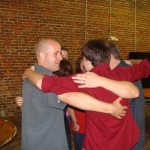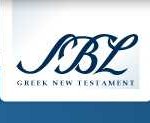Scripture Interpretation Commandments
Skye at “Out of Ur” has posted his “10 Commandments of Scripture Interpretation.” For the most part, I think his list and his explanations are right on target. Jump over and read through all 10. It’s a fairly short read.
I especially think we need to remember his first “commandment”: “I. You shall not make for yourself an idol out of Scripture.” Scripture is important… very important. But, Scripture is not God, and I’ve known some people who have turned Scripture into an idol, sometimes almost worshiping the physical book itself (or perhaps a particular translation?). (But now I see that several commenters are concerned about this “commandment.”)
Here are a few others that I think are very important:
III. You shall remember the metanarrative and keep it wholly.
V. You shall not neglect the context.
VI. You shall not ask questions the text does not want to answer.
hmmm… yep… that last one (VI.) gets us into all kinds of trouble, doesn’t it?
So, what do you think of Skye’s list? Any you disagree with? Any “commandments” you think we should add?
Can you imagine the impact…
I’ve been outside the United States a few times. Twice, I went specifically to serve people in the name of Jesus – once to Nicaragua and once to Ethiopia. In each instance, the time spent serving people from another country/culture changed me as much as it changed the people there. In many ways, during those times, I was forced to take my thoughts off of myself and my “things,” and put those thoughts towards other people.
Now, Dave Black (November 11, 2010 at 7:26 a.m.) has written an exhortation that I cannot ignore. I hope, as you read it, that you cannot ignore it either. We must ask ourselves what we’re doing… really doing… in the name of Jesus, and what we’re doing in our own name. Are we completely giving of ourselves, or are we holding part back so that we can maintain our stuff?
Here is the quote:
I had been hearing about missionaries all of my life. And now I’m the GIF, the Guy In Africa, that eccentric person who can’t feel comfortable among opulence any more, who stays up half the night thinking about a sick child in Alaba or a suffering woman in Burji or a persecuted evangelist in Gondar. I don’t ever want to lose this feeling, this marveling at the world, this attraction to a country called Black-Faced (Ethiopia) filled with outcasts and dying people and babies suffering from malaria and women needing fistula surgery, this nation of 80 million people worshiping their trees or their saints or their false gods. I never want to forget how incredibly small you feel when you’re trying to bring medical supplies through customs or watching the heart-wrenching poverty or scooping up a half-naked infant or standing next to the graves of missionaries from past generations who went out to the field and never came back home (or was it ever “home” for them again?). Can you imagine what would happen if Christians in America were to grasp the principle of sharing what they have to meet the needs of the Gospel around the world? Can you imagine what the impact would be if we stopped spending 95 percent of our church budgets on ourselves? Can you imagine the change it would make if we lived a lifestyle that matched our responsibility to a lost and dying world? Seven years ago my lifestyle was up from grabs. Every thought and every action was tested by the simple teachings of Scripture. I decided, along with Becky, that I would lay up no treasure for myself on this earth. Suddenly I was free — free from my bondage to material things, free to allow God to use me — a nobody — to be His hands and feet and arms in Africa.
I can imagine the impact. I can imagine the change. I’ve seen a small sample personally, and I’ve read about it in the New Testament.
The question is… now that we can imagine it… are we willing to live it? What is preventing us (me and you) from living it?
Love for one another is the truest praise
Strider at “Tales from Middle Earth” recalls a recent opportunity to speak “On the Church.” He had the opportunity to speak to and answer questions from a small group of believers. I love that the focus of his talk was on the “true nature of the Church.” He writes:
I was invited to speak to a small church yesterday. It was a good day as we spent about 7 hours together discussing all kinds of things. I was supposed to talk about Church Planting and we did some, but much of the day was spent with their questions. They asked about everything from, ‘who are those Sons of God things that come and breed with women in Genesis 6?’ to ‘If a guy becomes a believer but he has several wives what do we do?’ It was some good discussion but the best part was definitely in talking about the true nature of the Church. They,like so many here, have been established by foreigners who built a building, registered an organization,and then declared it ‘church’. It was great to see their faces light up when they found out that the Church is actually a community of the redeemed, that their love for one another is the very truest praise for our Father, and that Jesus Kingdom is not a meeting or a meeting place but the reign of God in our lives right now. Buildings and meetings are not good or bad, they are irrelevant to the love relationship we are to have with one another. It is remarkable to me how many people there are out here who have come to plant churches but have never really thought through- much less prayed through and did biblical study on- what a church is.
There are some great statements here: “The Church is actually the community of the redeemed.” “Their love for one another is the very truest praise for our Father.” “Jesus Kingdom is not a meeting or a meeting place but the reign of God in our lives right now.”
I hope more and more people begin to understand and to live their identity as the church of God, and that our love for one another will become more and more praise to God.
Teaching: An Analogy
I recently read a very good analogy on teaching that I wanted to share with my readers. The analogy is found in this comment on Lionel’s (from “A View From The Woods“) post called “We Supposed To Be Brothers,” and it was written by someone named Daniel. (I told him that I was going to steal it.) Here is the analogy:
In pondering all this, I have often ended up imagining what it would be like, to see someone “teaching†something like how to ride a bike, in the same manner that we “teach†in the conventional, church manner…
What would people think, if they came over one day and observed me “teaching†my kids how to ride a bicycle, which actually meant that my kids had to sit and listen to me, several times a week, talk for an hour or so about all the intricacies of how bicycles work. Each session would cover a different specific aspect of the mechanical workings of bicycles. I could cover the history and evolution of bicycle design, or go into intricate detail on the ways bicycles are ridden around the world. Week after week, I could lecture, and show slides, and have guest speakers, and on and on. But if after several years of doing this, and I never actually put my kids on a bike, and expected them to learn to ride on their own? People would think I was insane. They would hardly consider me a “teacher†of how to ride a bicycle, based on the fact that I failed to actually produce any people who could now competently ride a bike on their own…
What do you think of Daniel’s comparison between teaching in the church and teaching to ride a bicycle?
Seeking Opportunities to “One Another”
A few days ago, my friend Maël at “The Adventures of Maël & Cindy” published a post called “Those ‘one another’s.” Almost everyone knows about all the instructions and examples in Scripture in which the authors exhort their readers to think about others. In the post, Maël listed these “one another’s”:
bearing one another’s burdens (Gal 6:2)
encouraging one another (1 Th 4:18; Heb 10:25)
exhorting one another (Heb 3:13)
praying for one another
confessing our sins to one another (Jm 5:16)
speaking the truth in love to one another (Eph 4:15)
admonishing one another (Col 3:16)
building up one another (1 Th 5:11)
teaching one another (Col 3:16)
comforting one another (1 Cor 13:11)
submitting to one another (Eph 5:21)
serving one another (Mt 20:27-8)
patiently bearing one another (Eph 4:2)
regarding one another as more important than ourselves (Rom 12:10)
caring for one another (1 Pt 4:10)
exercising our spiritual gifts to serve one another (1 Pt 4:10)
being kind and tenderhearted to one another (Eph 4:32)
forgiving one another (Eph 4:32)
loving one another (Jn 13:34-5)
In response, my friend Jonathan commented, “A good follow up question, are we seeking opportunities to do them or are we sitting by passively doing them whenever someone gets desperate enough to ask for it?”
I’ve been thinking about Jonathan’s question since I read it a few days ago. I think he points out a huge difference in how we live our lives among other believers and among the world. Do we sit back and wait for people to ask us for help, or do we actively seek opportunities to help others, to teach others, to forgive others, to care for others?
Looking at Maël’s list, which “one another” do you think is most difficult to you? Thinking about Jonathan’s question, how important is it that we actively seek opportunities to do these “one another’s”?
Eating Together = Anti-Ritual?
Felicity Dale at “Simply Church” has written a very interesting post called “This helps to prevent religious rituals in a simple/organic church.” What is the “this” that she’s talking about? Eating together.
She writes:
Most simple/organic churches meet in the context of a meal. Â There is something about eating together that enables fellowship, and it’s harder to be “religious” where food is involved. Â Eating together usually involves laughter and sharing, good-natured banter and deep heart-to-heart discussions. Â As one of our friends likes to say, “How do you spell fellowship? Â It’s four letters:
F-O-O-D!
Most groups that we know share a potluck meal–it is reproducible and doesn’t leave too much work with the host family. Â A lot of fellowship goes on too over the preparation of food and the clean-up later. Â Some groups may even have their whole time together around the dining table.
I’ve also discovered that it is helpful to treat the meal as important as other parts of meeting together.
What do you think?
SBL Greek New Testament
The Society of Biblical Literature and Logos Bible Software are working together to create a new critical edition of the Greek New Testament. Apparently, it is going to be called the “SBL Greek New Testament” or SBLGNT. (HT: Evangelical Textual Criticism)
According to the website, the new edition is being edited by Michael Holmes, will be different from the Nestle-Aland (NA/UBS) text, and will be available for free download.
Furthermore, SBL will produce a print version of this new edition of the Greek New Testament.
I haven’t seen any information about the text itself. Hopefully, there will be some good reviews and comparisons coming out soon.
Gospel or Social Justice?
Two recent posts have suggested that our proclamation of the gospel must proceed along with social justice – that is, caring for people’s needs. Otherwise, the authors agree, we are not truly proclaiming the gospel.
The first post is from Arthur at “The Voice of One Crying Out in Suburbia” and is called “It cannot be one or the other, it must be both.” He says:
The problem is not an overemphasis on one or the other, it is that often the emphasis is on neither and it must be on both. The way we ensure that we don’t forget evangelism or mercy is to first, as Carson says, make sure we get the Gospel right. Second, equip all believers and give them the ability and encourage the inclination to do ministry in the world, to think outside of the church building for ministry opportunities. Third, be bold and clear that the life of a disciple of Christ is not one of insulated middle-class values and comforts but instead a self-denying, cross bearing life that will rub the world the wrong way.
The second post, which is like the first, is from Jared at “The Gospel-Driven Church” and is called “Why Social Justice is Necessary.” Jared gives us 8 reasons for including acts of mercy with gospel proclamation.
hmmm… the second is like the first… seems I’ve heard that before…
And one of them, a lawyer, asked him a question to test him. “Teacher, which is the great commandment in the Law?” And he said to him, “You shall love the Lord your God with all your heart and with all your soul and with all your mind. This is the great and first commandment. And a second is like it: You shall love your neighbor as yourself. On these two commandments depend all the Law and the Prophets.” (Matthew 22:35-40 ESV)
Oh yeah, I remember that now.
The Church is a Who?
I really appreciated this video from Rick at “The Blind Beggar” in a post called “the church: a who, not a what.”
(Apparently, Rick got the video from another blogger in a post called “What is the church?”)
(Or you can view the video directly from vimeo, where it’s called “When We Say Church.”)
My favorite part of the video is this: Several people speaking the following definition and description:
“The church is people… believing God… following Jesus… filled by the Spirit… loving each other… serving the city… changing the world.”
So many things would change if we really believed (by living) that the church is people.
Is Organic Healthier?
Okay, so I stole the title of this post from a site that promotes “organic” foods. But, it’s something to think about concerning the church also.
In his latest post, Lionel at “A View from the Woods” explains “Why I Chose the ‘Organic’ Way.” He gives us three reasons: 1) leadership, 2) learning, and 3) relationships. After explaining why each reason led him to a more “organic” expression of the church, he wraps up with this:
Leadership, learning and relationships amongst family should happen like a family. We are not an education institution, an entertaining institution, or a networking institution. I am not saying these things don’t occur when we meet, we are a family. We are a group of unlikely people, baptized into the Spirit to become one people. We have this thing that is unique to every other people group. It is called “fellowshipâ€, it is a metaphysical union that supersedes all earthly relationships. We are beginning everlasting life together and we are to express God’s life in one another. I do understand the benefits of organized church life. I understand having the dynamic pastor, the nice buildings, the nice worship team, the pristine teaching, the polished liturgy. I do and sometimes I miss it; however, I will never trade what we have today for anything else. I believe what we do is too important and means to much as we express ourselves to the world. What happens in the average church on Sunday is no different than what happens 5 days a week on my job, shallow relationships, a sense of togetherness with no real fellowship and so forth and so on. I want to know and be known by those who I will spend everlasting life with, the biggest reason is so that I may look more like Him.
I don’t think any believer would disagree with Lionel that leadership, learning, and relationships are important for the church. Like Lionel, I prefer more organic, and less structured expressions of the church. However, I think, we can find “organic” and healthy expressions of these things within more organized, institution-based churches.
But, I also think that as we pile on organization and structure and programs and etc., we tend to lose the organic (person-to-person) nature of the church. Instead of focusing on building each other up toward maturity in Christ, we tend to focus on building up our organization, protecting our programs, and defending our structures.
Meanwhile, the people – especially the little people who don’t matter as much in our organization, programs, and structures – tend to get pushed to the wayside. They become consumers and customers instead of partners and brothers and sisters.
But, of course, it doesn’t have to be like this. I know that many beautiful, healthy, Christ-honoring relationships are built and are grown in the midst of organized and structured churches and programs.
So, what is my point? Should we all (like Lionel) seek “organic” churches? Not necessarily.
Instead, we should all seek organic, natural – super-natural – relationships with other brothers and sisters, regardless of what structure or organization the church takes.
And, if the organization or structure gets in the way of those relationships? Well, just remember, the church is not the organization nor the structure. We must focus on the people. When the organization or the structure gets in the way, we must be willing to put it aside, or to step around it.










